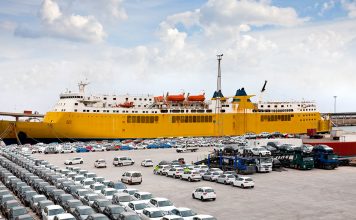
Former US President Barrack Obama with co founder Charles Ogingo
Kenya is a first in many a renewable energy innovation. The latest addition to this space is a solar-powered motorbike, a prototype of its kind in the transport sector. With the innovation of rural transportation interfacing with renewable energy, a lot of benefits are set to be realized in the rural transportation and trade sectors. Three University of Nairobi Mechanical Engineering graduates in Kenya have built a solar-conversion system christened the ‘Ecotran’, which captures solar energy, stores it in batteries which then is converted into electric energy and thus charges a motorcycle’s motor which propels the contraption.
The Kenyan informal transport industry is awash with riders or what is commonly referred to as “boda boda” which are predominantly found in the western region of the country, and would therefore benefit tremendously from this innovation in terms of reduced fuel expenditures. Motorcycles in their millions (In Nairobi alone, a 2013 study established that there are close to 2.25 million motorcycles, and of course that number has recalculated exponentially, and is expected to do so). In 2011, motorcycles constituted 70% of newly-registered automobiles by the Kenyan government, according to the World Health Organization (WHO). The western region is known for its lesser connectivity to the main grid, so this innovation is a promising one, according to the innovators. For an economy that is largely driven by the immense contribution of informal means of transportation such as the motorcycles which opens up the remotest rural places to the trading population.
How It Works
A fueling station of sorts which hosts 40 solar photovoltaic units, each with a sole capacity of 250 watts of electricity has been set up by the innovators. The energy from the units is stored in batteries before its transformation by powerful inverters into the alternating current (AC) used by the motorcycles. The small portable motorcycle battery when fully charged, can serve the rider for about 70 kilometers (40 miles), after which it must return to the station for recharging while another charged battery is fitted to the bike.
Like any other innovation, this novelty has its own challenges. One co-founder, a graduate of Mechanical Engineering, points out low acceleration and the performance challenge in a sloping topography as the only setback to this concept.

US Senator Chris Coons inspecting one of the solar powered motorbike taxi
Innovation Impact
After a successful pilot of the technology on three locally bought motorcycles in Kisumu County two years ago, the innovators are scaling up the project, and powering 40 more bikes and counting. Two years ago, the innovation attracted a USD $100,000 syndicated award by the United States African Development Fund and Power Africa, for the project scale-up.
One cannot ignore the environmental benefits that accrue from this innovation, granted that it doesn’t use petrol. This innovation is set to cut down the air pollution greatly. Air pollution-related illnesses and deaths occasion an estimated economic loss of $15 million a year in Kenya, according to a 2014 study by the University of Nairobi. The study findings also estimate a 39% of air pollution in Kenya, occasioned by motor traffic.
Economically, at the personal level, one of the co-founders, who used to ride a conventionally-powered motorcycle taxi, said he used to make rake in $10 on a good day, but would spend about $3.5 on fuel alone, and an additional $3 on bike leasing fees from its owner. Currently, it costs him $1 to recharge the electric motorbike, which is more than 50% reduction in fuel costs.







![Top 20 Used Cars to Avoid Buying in Kenya – [PHOTOS]](https://kenyacarbazaar.com/blog/wp-content/uploads/2013/11/top-used-unreliable-cars-to-avoid2-80x60.jpg)

![Here are some of the best tuned cars in kenya by state of the art garages [PHOTOS]](https://kenyacarbazaar.com/blog/wp-content/uploads/2013/11/29402_10151301757042065_340470732_n-e1384498044289.jpg)



![Top 20 Used Cars to Avoid Buying in Kenya – [PHOTOS]](https://kenyacarbazaar.com/blog/wp-content/uploads/2013/11/top-used-unreliable-cars-to-avoid2-100x70.jpg)






